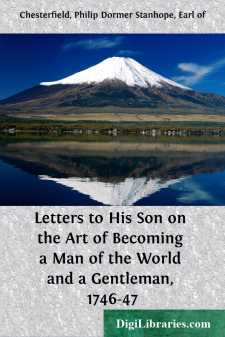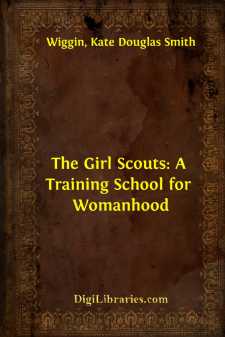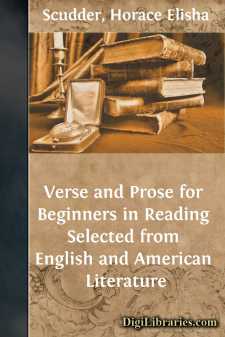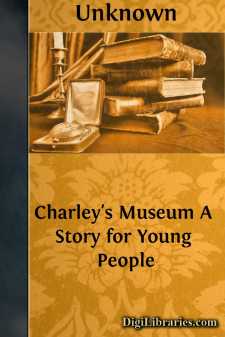Juvenile Nonfiction
- Animals 10
- Art 1
- Biography & Autobiography 2
- Boys & Men 1
- Business & Economics 3
- Cooking & Food 2
- Gardening 1
- General 32
- Girls & Women 7
- History 2
- Holidays & Celebrations 1
- Lifestyles 79
- Literary Criticism & Collections 5
- Nature 11
- Readers 40
- Religion 4
- Sports & Recreation 1
Juvenile Nonfiction Books
Sort by:
CHAPTER I Perhaps the things which happened could only have happened to me. I do not know. I never heard of things like them happening to any one else. But I am not sorry they did happen. I am in secret deeply and strangely glad. I have heard other people say things—and they were not always sad people, either—which made me feel that if they knew what I know it would seem to them as though some...
more...
by:
Unknown
CHAPTER I. THURSDAY. At a pleasant village a few miles from London, resided a widow-lady of the name of Harley; she had but one child, and to forming her manners and instructing her mind she devoted her whole time. Anne (for so was this little girl named) was an amiable child; she rewarded her mother's care and affection, by paying great attention to her instructions; like all other children, she...
more...
Our Best Friend IN A log cabin in the mountains lived a little boy. He often played near the house, but did not go far away. Near the house were many trees and rocks and among these wild animals stayed. DOWN BY THE SPRING One day the boy missed his mama and thought he would try to find her. He went down the path toward the spring, where he had often gone after water. He went on and on. Finally he...
more...
THE CHILDREN'S SONGLand of our Birth, we pledge to theeOur love and toil in the years to be,When we are grown and take our place,As men and women with our race.Father in Heaven who lovest all,Oh help Thy children when they call;That they may build from age to age,An undefilèd heritage.Teach us to bear the yoke in youthWith steadfastness and careful truth;That, in our time, Thy Grace may giveThe...
more...
The proud Lord Chesterfield would have turned in his grave had he known that he was to go down to posterity as a teacher and preacher of the gospel of not grace, but—"the graces, the graces, the graces." Natural gifts, social status, open opportunities, and his ambition, all conspired to destine him for high statesmanship. If anything was lacking in his qualifications, he had the pluck and...
more...
I am heartily interested in the Girl Scouts of America. The fact is, I think I was always a Girl Scout myself (although the name was unknown); yes, from the very beginning. Even my first youthful story was “scouty” in tone, if I may invent a word. Then for a few years afterward, when I was “scoutingly” busy educating little street Arabs in San Francisco, I wrote books, too, for and about...
more...
VERSE AND PROSE FOR BEGINNERS IN READING. ALPHABET. A was an apple-pie;B bit it;C cut it;D dealt it;E ate it;F fought for it;G got it;H had it;J joined it;K kept it;L longed for it:M mourned for it;N nodded at it;O opened it;P peeped into it;Q quartered it;R ran for it;S stole it;T took it;V viewed it;W wanted it;X, Y, Z, and amperse-and,All wished for a piece in hand. A DEWDROP. Little drop of...
more...
MY DEAR FRIEND: I received two days ago your letter of the 25th past; and your former, which you mention in it, but ten days ago; this may easily be accounted for from the badness of the weather, and consequently of the roads. I hardly remember so severe a win ter; it has occasioned many illnesses here. I am sure it pinched my crazy carcass so much that, about three weeks ago, I was obliged to be let...
more...
The Author’s Preface to the Reader. Instruction is the means to expel Rudeness, with which young wits ought to be well furnished in Schools: But so, as that the teaching be 1. True, 2. Full, 3. Clear, and 4. Solid. 1. It will be true, if nothing be taught but such as is beneficial to ones life; lest there be a cause of complaining afterwards. We know not necessary things, because we have not...
more...
by:
Unknown
CHARLEY'S MUSEUM. Charley Carter was a bright, active lad, of twelve years old, the son of a farmer, who lived a few miles distant from Philadelphia. He was a very great favorite of his uncle Brown, his mother's brother, who was a wealthy merchant in the city. He was also a favorite of another brother of his mother, who had been, for many years a sea captain, sailing to all parts of the...
more...











